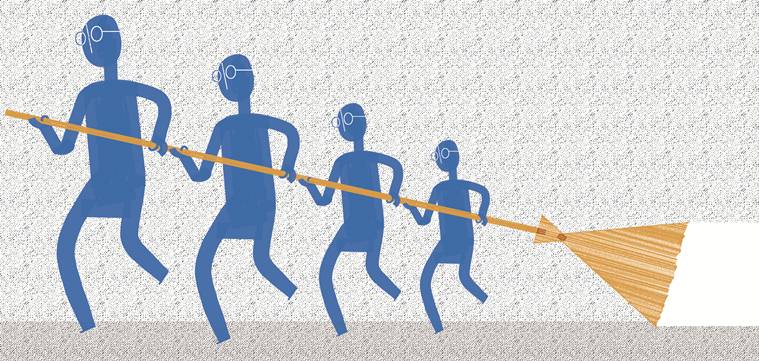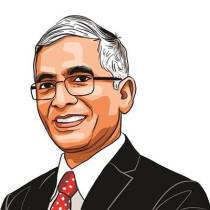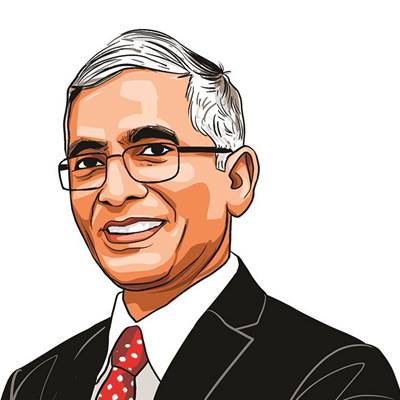Satyagraha then, Swachhagraha now
The nation symbolically bound in the fabric of swachhata, with everyone offering their service for nation-building, would be most satisfying for the Mahatma.

C R Sasikumar
No one person has had a bigger influence on the shaping of India than Mahatma Gandhi. He was at once a man of action and a visionary. He worked and strove tirelessly for an India that would be a beacon of peace and harmony in an unstable, often violent world. He worked and strove tirelessly for an India where the dignity and well-being of the weakest would be the highest priority of the strongest. He worked and strove tirelessly for a united India, where people from all walks of life would work towards the common goal of serving the nation and building it. Beyond the nation, he embodied the collective conscience of the world.
This week, as we celebrate the commencement of Gandhi’s 150th birth anniversary year, it is an opportunity to reflect on those Gandhian actions and ideals and evaluate the progress we have made towards creating the India of his dreams. So, if a time machine could fast forward Gandhi to the India of 2018, what would he see?
Today, we are on the cusp of transitioning from an emerging economic power to being regarded as a global economic superpower. We have also made massive strides on a variety of social indices. The percentage of people below the poverty line has been steadily reducing, infant mortality is at an all-time low, literacy rates are rising, the sex ratio is improving and life-expectancy is increasing. Gandhi would surely be happy on these counts.
But what would undoubtedly please him more than anything else, I dare to conjecture, is the fact that the people of India have collectively rallied around a subject that was extremely close to his heart — sanitation and cleanliness. Gandhi had famously equated the importance of sanitation to political independence. Today, India is fighting and winning the war against insanitary practices like open defecation using the same principles and methods of mass mobilisation that were used during the war of political independence under Gandhi’s leadership. It was Satyagraha then, it is Swachhagraha now, but the spirit bringing about change by the people at the centre of the change process, is the same.
Prime Minister Narendra Modi’s unprecedented reference to toilets in his 2014 Red Fort address, and the audacious commitment to eliminate open defecation in the country in a short span of five years, would have warmed Gandhi’s heart. The latter had openly spoken about the ills of open defection on multiple occasions. “The cause of many of our diseases is”, he said in Navjivan weekly in May 1925, “our bad habit of disposing of excreta anywhere and everywhere. I therefore believe in the absolute necessity of a clean place for answering the call of nature.”
Yet, for many decades after Independence, poor sanitation and open defecation remained unspeakable truths, and languished at the bottom of our developmental priorities. But in the past few years, ever since the prime minister put swachhata at the top of his developmental agenda, sanitation has come to the forefront of the nation’s consciousness and has finally got the due recognition it deserved, the importance that Gandhi had awarded it in his time.
The wave of swachhata is sweeping across the country at an accelerated pace. Men and women, young and old, rich and poor, everyone has become a sanitation champion. There are stories of extraordinary leadership emerging from every nook and corner of the country. People are changing their own age old habits and are inspiring others around them to do the same. The swachhata bug has caught on to all sectors, from schools to hospitals to tourist places and everything in between. For Gandhi, this energy and fervour would be reminiscent of the Independence movement days. More importantly, the fact that the nation is symbolically bound in the fabric of swachhata, with everyone offering their service for nation building, would be most satisfying for the Mahatma.
The SBM has already achieved a lot more than what we had achieved in all the post-Independence years till 2014. Sanitation coverage in India has increased from less than 40 per cent in 2014 to over 94 per cent today. Over 50 crore people have adopted safe sanitation and given up open defecation. In over three quarters of all our villages today, no one defecates in the open. Nearly 5 lakh swachhagrahis and innumerable unnamed sanitation crusaders are the foot soldiers of this mass movement. Most communities are now united in their resolve to never let open defecation back into their lives.
And this movement of freedom from open defecation is leading to improvements in health and financial indicators for rural households. The World Health Organisation has estimated that India will save over 3 lakh lives by 2019 on account of the SBM. UNICEF has estimated that each rural household in an open defecation free village saves Rs 50,000 per year. India held the infamous record of having the highest number of stunted children in the world, this number is expected to steadily decline as the longer term benefits of safe sanitation kick in.
If Gandhi visited India today, he would undoubtedly be happy with what India has managed to achieve on the sanitation front in the last four years. He would be proud of the example we have set for other countries who are grappling with the problem of rampant open defecation. In an effort to share our story with the world, and hopefully inspire them to prioritise sanitation like we have, India is hosting the Mahatma Gandhi International Sanitation Convention on the occasion of the fourth anniversary of the SBM, and the launch of the 150th birth anniversary year of Mahatma Gandhi. This is our small way of paying tribute to the great soul who dreamt of a country and world dedicated to good sanitation.
The writer is Secretary, Ministry of Drinking Water and Sanitation. Views are personal
For all the latest Opinion News, download Indian Express App
More From Parameswaran Iyer
- Wealth from wasteGOBAR-Dhan initiative will aid Swachh Bharat, increase rural incomes..
- Service For SwachhataIn three years, Swachh Bharat Mission has become a mass movement...
- More Than ToiletsSwachh Bharat Mission is about behaviour change vis a vis sanitation. Five states, 186 districts and over 2,31,000 villages have been declared as open defecation…








































No hay comentarios:
Publicar un comentario